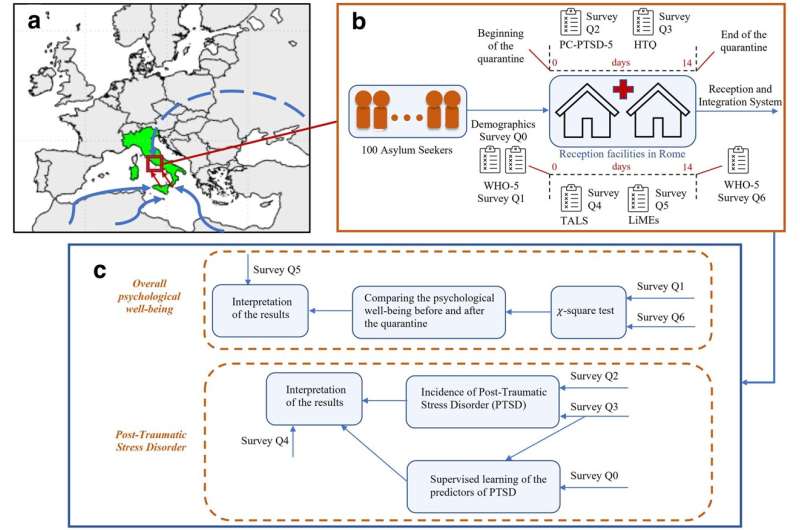This article has been reviewed according to Science X's editorial process and policies. Editors have highlighted the following attributes while ensuring the content's credibility:
fact-checked
peer-reviewed publication
trusted source
proofread
Refugee centers benefit asylum seekers' mental health, study finds

Sheltering in refugee centers can positively impact asylum seekers' mental health, according to a new study published in Communications Medicine, underscoring the benefits of providing migrants safe and welcoming transitional environments in which professionals in the host countries monitor their psychological and physical needs.
The study's multidisciplinary research team, coordinated by Emanuele Caroppo—Head of International Projects and Researches at the Department of Mental Health Asl Roma 2—administered a battery of six questionnaires, ranging from demographic surveys to comprehensive psychological assessments, to a cohort of 100 asylum seekers in 14-day COVID-19-related quarantines in Italy between August 2020 and September 2021.
Maurizio Porfiri, NYU Tandon Institute Professor and Director of the Center for Urban Science and Progress (CUSP), designed the framework for the statistical analysis and led the interpretation of the results. He and Pietro De Lellis, associate professor in the Department of Electrical Engineering and Information Technology at University of Naples Federico II, are the corresponding authors on the paper.
The study's aim was to understand the impact of the first contact with the reception system on the mental health of asylum seekers and to delve into predictors of post-traumatic stress disorder (PTSD) among that population.
Of asylum seekers in the study, 23% had PTSD—higher than the 4% to 10% incidence previously reported among the general global population. Pre-migration traumatic experiences were the key influencers in the the development of PTSD, including the infliction of bodily injury and torture, and witnessing violence. The study found no specific demographic factors that played a crucial role in predicting PTSD. Social ties and education levels did not emerge as salient features to predict the onset of PTSD.
Despite the incidence of PTSD, the authors also observed that a 14-day stay in reception facilities appeared to positively impact asylum seekers' mental health, with the proportion of participants needing to undergo further psychological assessments decreasing from 51% to 21% throughout the quarantine period.
The study offers a significant step towards understanding the relationship between migration, mental health, and the reception environment. Asylum seekers, who have already endured tremendous hardship, may find a glimmer of hope in the notion that a supportive and secure environment can significantly contribute to their psychological well-being.
More information: Emanuele Caroppo et al, Migrants' mental health recovery in Italian reception facilities, Communications Medicine (2023). DOI: 10.1038/s43856-023-00385-8

















